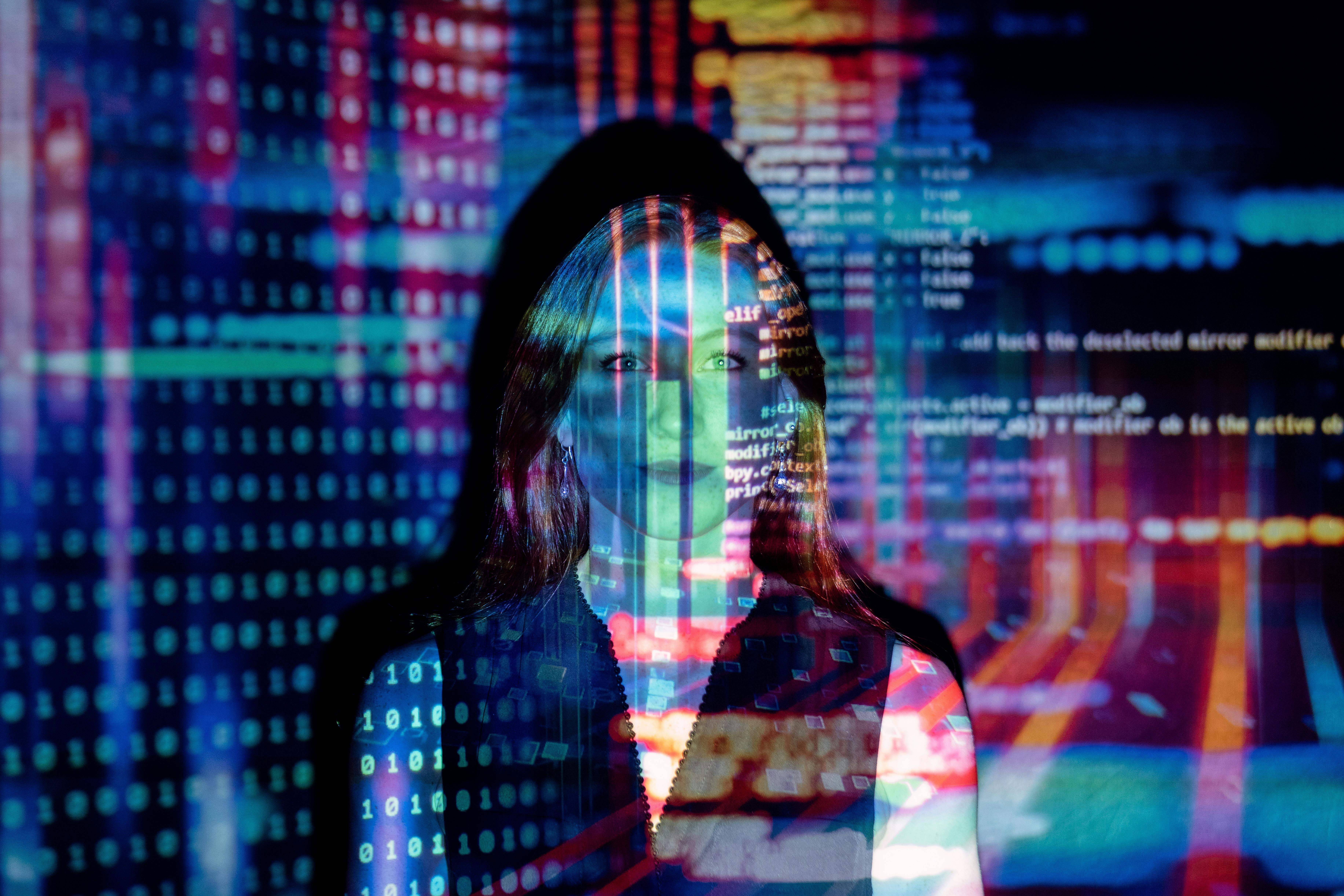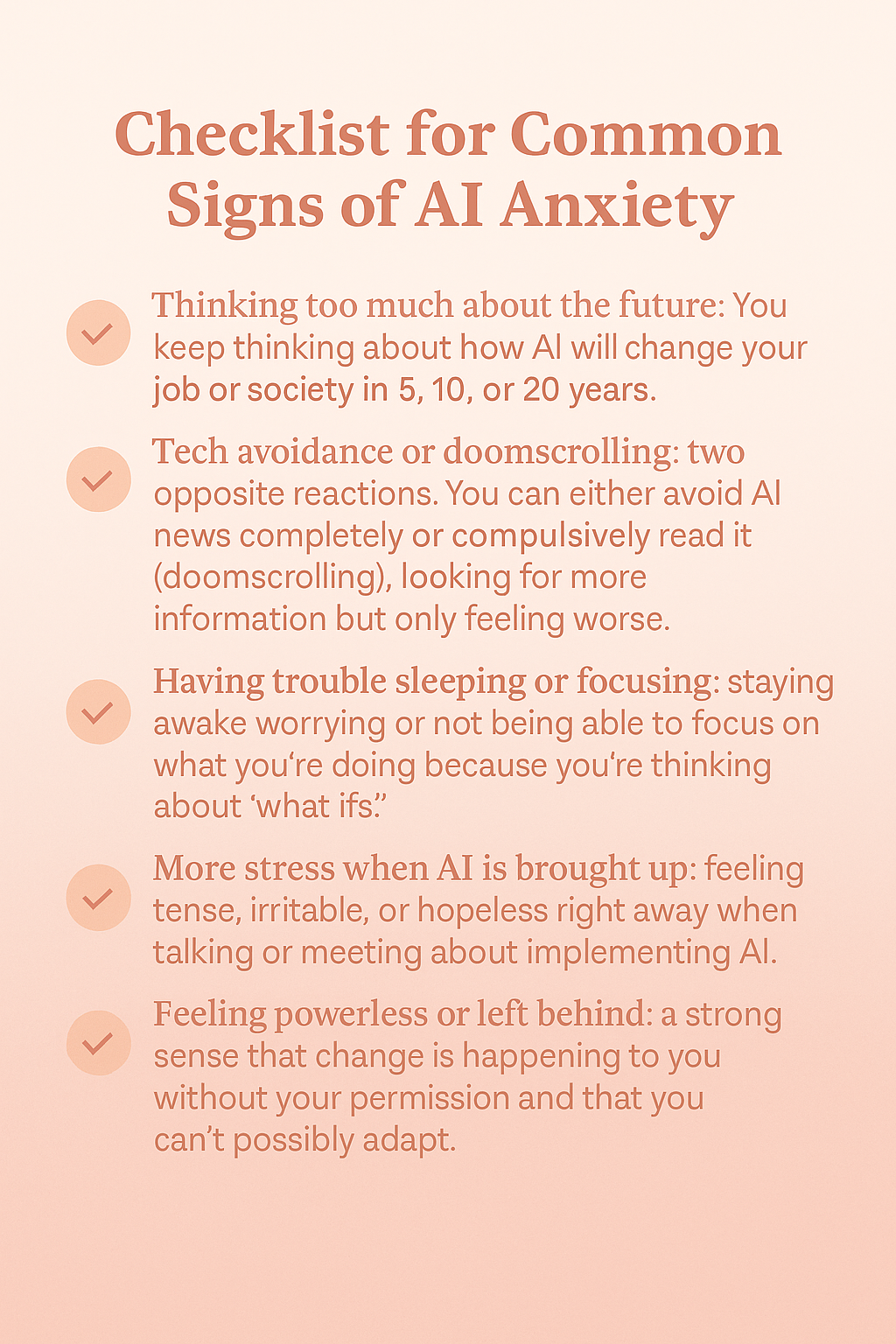AI Anxiety: What It Is and How to Stay Grounded in a Changing World

Sarah Johnson, MD

Are you worried that AI would take your job or change society? If so, you're not the only one. People call this feeling "AI anxiety." It's a growing emotional response to the fast and seemingly random changes in technology that artificial intelligence is bringing about. It's the feeling of dread you get when you read about another job being automated or the feeling of being completely overwhelmed when a new, powerful AI tool comes out of nowhere.
It's normal to feel this way. It's normal for people to feel this way when the basic rules of work, creativity, and community change so quickly. This article isn't about getting rid of your fears. Instead, we'll look at where this modern ai anxiety comes from and, more importantly, give you a practical plan for how to deal with it in a positive way so that you can go from feeling helpless to feeling ready.
Are you worried about how AI might impact your career or daily life? You're not alone—many are turning to a Mental Health AI for support in navigating these modern anxieties.

What Is AI Anxiety?
AI anxiety is a type of fear or stress that comes from worrying about how artificial intelligence will change our lives — similar to the difference between worry and anxiety in how our minds process uncertainty. It goes beyond just being afraid of technology; it focuses on how AI might affect job security, privacy, creative expression, and even our sense of identity and purpose. People have always been worried about technology, but AI's ability to learn, adapt, and create makes these worries even worse.
The emotional effects of AI anxiety show up as a constant fear of being replaced by machines, a lack of trust in AI-driven decisions, or a fear of a future where human skills are less valuable. People are afraid of automation because it could not only change how we work but also make our jobs completely useless. In short, AI anxiety is the worry that AI will become an unstoppable force that we can't control or keep up with.
Why Is AI Anxiety Increasing?
A few things are coming together to cause the current wave of AI-related stress, contributing significantly to what is now widely recognized as ai anxiety.
1. Rapid Technological Advancement
AI development is moving at an unprecedented speed. Big breakthroughs that used to take years now happen in just a few months. This makes people afraid of the unknown and feeds the core of ai anxiety, making them feel like they can't keep up, which makes them feel like they're always behind before they even start.
2. Media Narratives and Misinformation
Headlines that are too sensational often take over the conversation, going from utopian dreams to doom-mongering about the end of the world. Stories about mass job loss panic, the threat of deepfakes, and speculative fiction about AI domination all add to a story of powerlessness and certain disaster, making it hard to tell what's real and what's hype and directly fueling public ai anxiety.
3. Personal Identity and Job Security
A job is a big part of who a lot of people are. This is directly threatened by AI's ability to automate tasks in creative, administrative, and even tech-related fields. People are afraid not only of losing their jobs, but also of becoming useless and losing their sense of value and contribution to society, which is a primary driver of ai anxiety.
4. Ethical Concerns
Concerns about data privacy, mass surveillance, and the biases built into AI systems are real and add to the anxiety in society. People are even more worried and distrustful because they wonder if these powerful tools will be used fairly and responsibly, adding a complex ethical layer to ai anxiety.
Signs and Symptoms of AI Anxiety
How can you tell if you're really feeling ai anxiety? Check for these common signs of behavior and emotion:

This anxiety about the future and feeling overwhelmed by technology is a type of mental fatigue that comes from taking in too much scary information without feeling like you have any control over it, a core component of ai anxiety — often leading to a mental block caused by overwhelm.
Common Triggers of AI Anxiety — and How to Manage Them
| AI Anxiety Trigger | Coping Strategy | LSI Keywords |
|---|---|---|
| Fear of job automation | Develop hybrid skills that combine human creativity and AI tools | future of work, career disruption |
| Constant exposure to alarming tech news | Limit media intake and practice digital hygiene | doomscrolling, digital fatigue |
| Overwhelmed by rapid AI changes | Stay informed through balanced, non-sensational sources | technostress, algorithmic literacy |
| Loss of control or purpose | Use mindfulness and grounding exercises daily | AI burnout, identity crisis |
| Concerns over data privacy and bias | Learn about ethical AI practices and tools | algorithmic bias, ethical AI |
How to Cope With AI Anxiety
Getting over ai anxiety means getting back a sense of control and perspective. Here are some things you can do right now.
1. Understand What’s Real vs. Hype
Make sure to keep science fiction and real life apart. Find out what AI can and can't do right now. Most AI is meant to enhance things, not replace them completely. Instead of sensationalist news outlets, get your information from technical, balanced sources. Knowledge really is power here and a key first step in managing ai anxiety.
2. Focus on What You Can Control
Put your ai anxiety to use. Find the skills that go well with AI (like critical thinking, creativity, and emotional intelligence) and work on them. Learn how to use AI tools in your field before you need to. This changes how you think from "I am a victim" to "I am an adapter."
3. Practice Digital Hygiene
Pick and choose what information you take in. Stop following accounts that make you want to doomscroll. Instead of letting tech news bombard you all day, set aside specific times to check it. To avoid cognitive overload and ease ai anxiety, make sure to take regular breaks from technology to read a book, go outside, or do something with your hands. Too much screen time can lead to overstimulation from constant tech exposure, which only deepens the sense of burnout.
4. Use Mindfulness to Regain Mental Space
Use grounding techniques to bring yourself back to the present when your worries about the future start to spiral out of control. Simple things like breathing exercises, meditation, or a short walk can break the cycle of worry that fuels ai anxiety. Mindfulness helps you remember that you are here now and that the scary future is not your current reality.
5. Talk About It
You are not the only one going through this. Talk to coworkers, friends, or mentors about your worries. Talking about your fears often makes them less powerful and shows that other people have been through the same things. If you want more structured help, you could try digital wellness tools or even talking to an AI therapist to deal with ai anxiety and digital stress. There are already AI tools supporting mental health that make guidance more accessible and stigma-free.
When to Seek Professional Support
It's normal to feel anxious sometimes, but it's important to know when your ai anxiety gets out of hand. If your ai anxiety is getting too much for you, think about getting help from a therapist or counselor, especially if it:
- Keeps getting in the way of your sleep, work, or relationships with other people.
- Makes you feel panic, dread, or depression all the time.
- Makes people act in ways they can't help, like not being able to stop reading bad AI content.
Digital wellness coaches and other mental health professionals can provide strategies to manage ai anxiety and reframe your relationship with technology. For some, exploring using AI for therapy can complement human support and help build a more balanced mindset.
FAQ About AI Anxiety
Is AI anxiety a real condition?
Yes. It is not yet a formal clinical diagnosis, but it is a well-known and growing topic of conversation in mental health and wellness circles. It comes from very real changes in society.
Can AI anxiety affect job performance?
Yes, for sure. Fear and stress can make it harder to concentrate, lower your confidence, make you less willing to try new things, and make it harder to make decisions, which can lead to a self-fulfilling prophecy.
What types of people are most affected?
Anyone can feel it, but creative professionals, tech workers, and students who are directly affected by AI-driven changes often say they feel it the most.
Can mindfulness help with AI-related stress?
Yes. Mindfulness practices are great for breaking the cycle of thinking about the future all the time. They help you stay in the present and lower your overall stress levels.
Are there mental health apps for AI anxiety?
Yes. A lot of general mental health apps have tools for dealing with anxiety. There are also a lot of new digital wellness tools, like AI-powered therapeutic chatbots, guided meditations, and journaling apps, that are meant to help people deal with their modern fears.
You’re Not Alone, and You’re Not Powerless
In the end, you are not alone and you are not powerless.
It's normal to feel ai anxiety in a world that is changing quickly. But in that ai anxiety is a chance—not to be afraid, but to change. It's okay to feel overwhelmed; what matters is what you do next.
You have more power than you think. You can get through this new world with strength by taking small, useful steps like curating your information diet, focusing on learning, connecting with others, and staying grounded in the present to manage your ai anxiety. The point isn't to get ahead of the technology; it's to learn how to run with it on your own terms.














